Recent posts have asked whether companies should designate a Chief Collaboration Officer, and who within the enterprise should assume the role of Chief Collaboration Officer. I've never been one hung-up on job titles, and don't see a need to find someone to assign the title of Chief Collaboration Officer. What's next- a Chief Social Officer? A Chief Teamwork Officer? A Chief Engagement Officer? Anyone for a Chief Culture Officer? Collaboration is the competitive advantage of the decade if you can learn to harness it, but just like teamwork before it, harnessing it's power is going to take a cultural shift in the organization that should not rest on the shoulders of any one chief, but on the shoulders of everyone. In the case of collaboration, the heads of human resources and IT should enable it by implementing the right people policies coupled with the right technological infrastructure for the organization. But like many enterprise-wide initiatives, the cultural shift in mindset should be communicated and modeled by the leaders of the organization and reinforced throughout by mid-management ranks.
More than assigning an individual the job of championing collaboration, companies should recognize that this cultural shift requires all hands on deck. HR policies and IT solutions should be put in place that enable people to collaborate effortlessly with one another-especially when workflows and business processes are identified that can be improved or accelerated by social technologies. In these situations, baseline measures on the efficiency of the business process should be taken to then compare once social initiatives are put into place. Barriers to collaboration should be removed, and individuals who excel at collaborative behaviors should be rewarded and celebrated.
While I agree with Jane Hart and others that point out that a Chief Learning Officer is at times ideally positioned to take over the collaboration lead, I'd much rather see a leader emerge from the organization. This individual should be a role-model for others in the enterprise, one who others look to for direction on how best to excel at their roles. Additionally, this organic leader should champion the organization's social tools of choice, and articulate to others how to best use them.
By not taking a top-down approach, this individual will from the offset have more credibility than any head of learning, IT, HR, or other chief within the firm. More structure and hierarchy are not how to achieve a more collaborative enterprise. Social enterprise technology is unleashing a powerful wave of decentralization that will transform and disrupt traditional business hierarchies, and this revolution will be led from the ground up.
- Alex Santos
Alex is a co-founder and Managing Member of Collabor8 Learning, LLC, an instructional design and performance management consultancy. His firm collaborates with organizations to enhance the way they develop and train their people. To learn more about Collabor8 Learning, click here.
Alex can be reached at 786-512-1069, alex@collabor8learning.com or via Twitter@collabor8alex.

